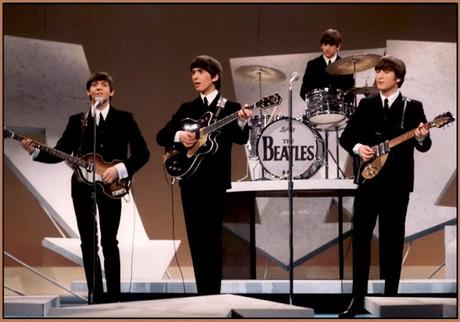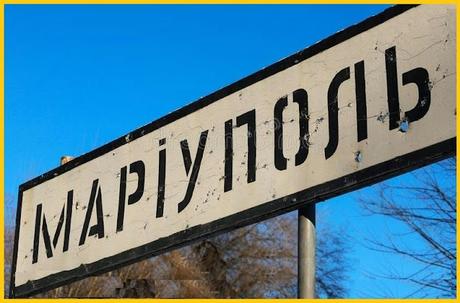I've chosen instead to highlight a different and more recent three days that changed the world, namely The Beatles' appearances on the Ed Sullivan Show. We can be precise about those dates: not three consecutive days, but three consecutive Sundays: 9th, 16th and 23rd February 1964. In light of John Lennon's 'infamous' remark from a couple of years later of The Beatles being "more popular than Jesus now" (more on that below), I thought it an interesting parallel to draw.
The Ed Sullivan Show aired on CBS every Sunday night and was at the time the most popular American entertainment programme with an average audience of 24 million viewers. Brian Epstein, manager of The Beatles, knew that if his group was to 'break' America, then exposure on the medium of the moment was necessary. The Beatles' early singles had not taken off in the States. EMI's US subsidiary had passed on the opportunity to release them. 'Love Me Do' got ignored completely and 'Please Please Me', 'From Me To You' and 'She Loves You' were licenced out to small independent labels and sank without trace. Finally Epstein managed to persuade EMI's subsidiary Capitol to release the next one 'I Want To Hold Your Hand' at the end of 1963 as a lead-in to the television appearances he had negotiated. By the beginning of February 1964 'I Want To Hold Your Hand' had hit the top of the US charts and a week later The Beatles were performing live on the Ed Sullivan Show to an estimated audience of 73 million people (nearly half the viewing nation) - a ratings record and a generation-defining event. Urban myth has it that crime statistics for the night were the lowest for years. Their second appearance the following Sunday attracted nearly as big an audience of 71 million viewers and those two programmes are still in the top three all time tv audiences in the USA, being surpassed only in 1983 by the final episode of M*A*S*H. The third appearance on 23rd February didn't draw quite so big an audience as by then half the teenagers in the country were in their garages forming Beatle-inspired pop groups!

The Beatles as first seen by millions on US tv screens
That last point was not an entirely facetious one. In the wake of the shock of President Kennedy's assassination less than three months earlier, the USA had been in something akin to a collective depression, a state of mourning and disorientation that sucked the joy out of life and sapped the nation's natural optimism. Those appearances by The Beatles on the Ed Sullivan Show single-handedly (OK, eight-handedly) gave the country its joy back, lifting not just teen spirits from coast to coast. The nation went into catch-up mode and within a month The Beatles held the top five spots in the US Billboard singles chart (those earlier 45s finally getting airplay and sales), another record that's never been broken. Young Americans did form bands directly as a result of seeing The Beatles. They also got caught up in the whirlwind of Beatlemania, bought the merchandise, grew their hair, became less parochial in outlook, and made almost a religion out of their fascination with the group and its music - and that embrace of The Beatles by America was what catapulted them to global fame and changed the world for the better in the process. So had they really become "more popular than Jesus"?What John Lennon actually said, in an interview with Maureen Cleave of the Evening Standard in March 1966, was: "Christianity will go. It will vanish and shrink. I needn't argue about that; I'm right and I'll be proved right. We're more popular than Jesus now; I don't know which will go first - rock'n'roll or Christianity. Jesus was all right but his disciples were thick and ordinary. It's them twisting it that ruins it for me." His remarks were mis-quoted and misinterpreted in the American press which led to a series of Beatle-record bonfire events in the southern bible belt at the start of the group's final US tour, a temporary blip on their staggering rise to unparalleled planetary fame and popularity.Okay, in complete contrast to the happy vibe of Beatlemania, I offer my second poem catalysed by the wicked war being waged by Putin in Ukraine - another event with a claim to having changed the world in the last few weeks.
Of all the Ukrainian cities Putin has targeted to date, the southern Black Sea port of Mariupol has been the hardest hit, pounded relentlessly by Russian artillery and surrounded by advancing Russian troops. The majority of its buildings have been destroyed, the civilian population has been living for weeks in cellars and basements, without electricity or running water. Thousands have been allowed to flee along occasional humanitarian corridors and the stories they tell are heart-rendingly awful. Thousands more have been killed in what clearly constitutes the worst war crime in Europe since WW II. Thousands remain trapped, starving, facing an uncertain fate in what has been described as "hell on earth" Ukrainian forces have been holding out bravely but are short of ammunition and it is feared Mariupol is about to be the first city since the invasion to fall into Russian control.

bullet-riddled Mariupol city sign
It is very hard for us to comprehend the evil that can foist such suffering and devastation on innocent people. It is equally difficult for us to imagine the depth of fear and misery that living through war entails. The horror is so vast it's not easy to get to grips with. So the poem focuses right down on a few specifics as befits this week-end, and in doing so seeks for a shaft of something positive in the bleakness.Easter In MariupolNo eggs this Easter in Maria's city, not a chicken left alive. And God,where is he to be found today? Inthe thin smile of a starving childclutching a dirty rag rabbit? Maybe,for innocence has a power to toucheven a steely heart toting an AK-74,invader and orphan hand-in-handin the darkness of this earthly hell.Hope treads on fragments of shells.As a musical Easter egg, here's a link to Julian Lennon singing his father's famous song for the first time in public recently at a concert for Ukraine. Click on the title to play: Imagine

Thanks as ever for reading my stuff, S ;-) Email ThisBlogThis!Share to TwitterShare to Facebook
